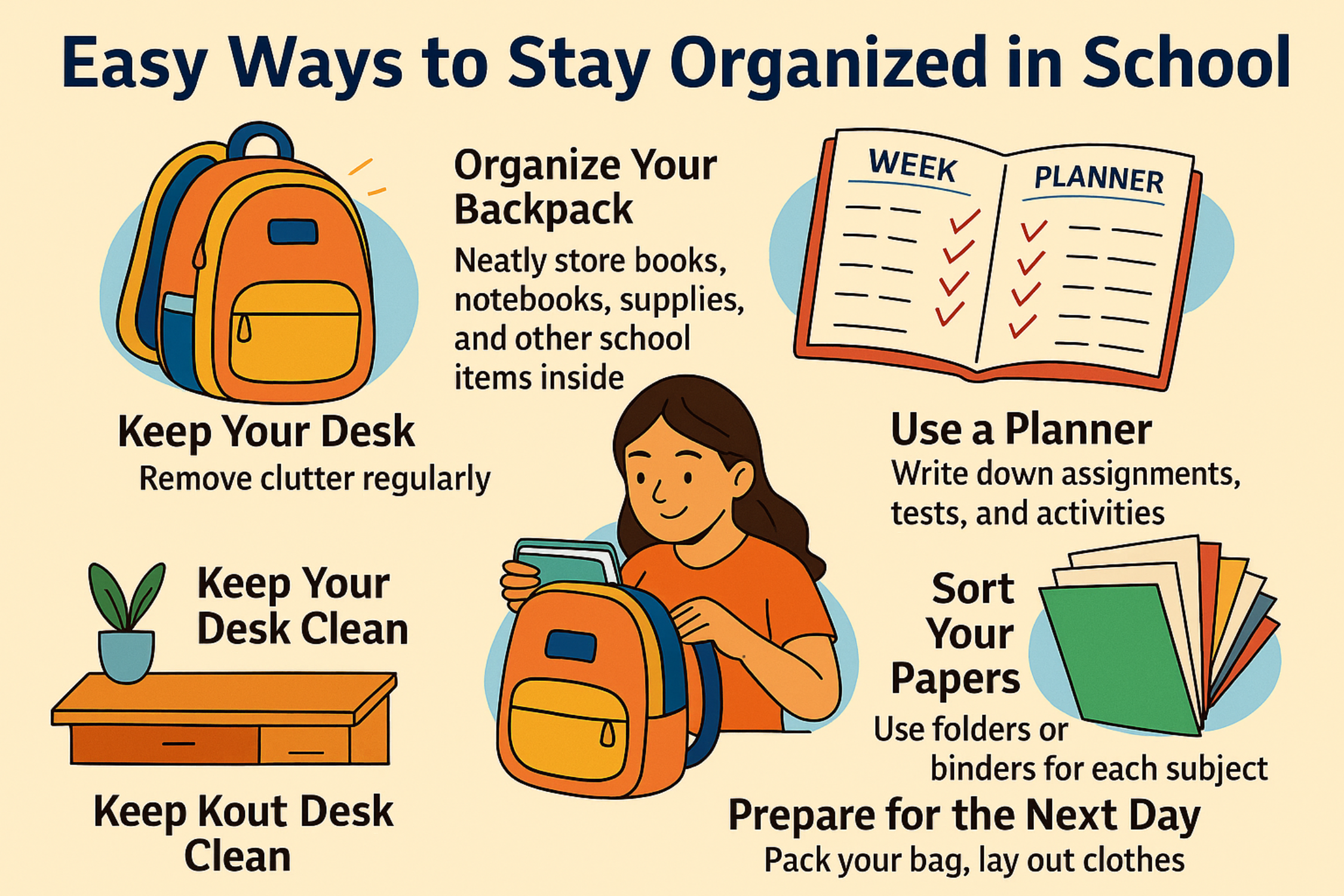Staying organized in school helps you manage your time, reduce stress, and do better in your studies. Whether you’re in primary school, middle school, or high school, being organized helps you stay on top of homework, assignments, and exams. It also makes your school life more peaceful and enjoyable.
In this blog, we’ll explain simple and practical ways to stay organized in school using easy-to-understand language. You don’t need fancy tools—just some good habits and a little planning.
Why Staying Organized is Important
Before we talk about how to stay organized, let’s understand why it matters:
- Less stress: When your books, notes, and timetable are in order, you feel less worried and more in control.
- Better time management: You can complete work on time and have free time left for fun and rest.
- Improved grades: When you don’t miss deadlines and keep your study materials in order, you perform better in class.
- Good habits for life: Being organized now will help you in college, work, and even at home.
1. Keep a Daily Routine
Having a daily routine helps your brain know what to expect every day. Try to wake up, study, play, eat, and sleep at the same time each day. It keeps your body and mind in rhythm.
You can make a timetable and stick it on your wall or study desk. Write down when you’ll do your homework, revision, and play.
2. Use a School Planner or Diary
A school planner is a small notebook or diary where you can write:
- Homework deadlines
- Exam dates
- School events
- Study schedules
Check your planner every morning and before going to bed. It helps you remember important tasks so you don’t forget them.
3. Organize Your Study Space
Keep your study table clean and tidy. Remove things you don’t need like toys or games while studying. Only keep items like:
- Books
- Notebooks
- Pens and pencils
- A clock or timer
- A water bottle
When your space is clutter-free, you can concentrate better.
5. Pack Your School Bag Every Night
Instead of rushing in the morning, pack your school bag before bed. Check your timetable and keep the required books, notebooks, lunch box, and water bottle ready. This habit saves time and avoids forgetting important items at home.
6. Use Sticky Notes and Reminders
Sticky notes are helpful reminders. You can stick them on your wall, books, or even your study table. Write quick notes like:
- “Bring science project tomorrow”
- “Revise history chapter today”
- “Submit drawing assignment”
If you use a phone, you can set reminders using the alarm or notes app. But don’t get distracted by other apps—use them only for reminders.
7. Keep a Homework Folder
Have one folder where you keep all your homework—completed and pending. It helps you track which work is done and what’s still left. You won’t lose worksheets or forget to submit them.
Make sure you put completed homework back into your school bag so it’s ready to be submitted.
8. Break Large Tasks into Smaller Steps
If you get a big assignment or project, break it into smaller parts. For example, if your teacher says to submit a 5-page science project in a week, plan it like this:
- Day 1: Decide topic and collect information
- Day 2: Write introduction
- Day 3: Add images and details
- Day 4: Complete and revise
- Day 5: Final check and print
Smaller steps are easier to manage and less stressful.
9. Review and Update Your Notes Weekly
Make a habit of going through your class notes every weekend. This helps you revise and keeps your memory fresh. If you missed any notes, you can borrow and copy them in time. You can also organize your notes properly during this time.
10. Ask for Help When Needed
If you’re feeling confused or overwhelmed, ask your parents, teachers, or a tutor for help. Staying organized doesn’t mean doing everything alone. Sometimes a little support can make a big difference.
11. Use Timers for Study and Breaks
You can use a timer or alarm clock to study for 25–30 minutes and then take a 5-minute break. This method keeps your mind fresh and stops you from getting bored.
During breaks, stretch your body, drink water, or take a short walk
Spend 10–15 minutes every week cleaning your study area. Throw away old papers you don’t need. Sharpen your pencils, refill pens, and put things back in their place. A clean space means a clean mind.
14. Make a To-Do List
Write down everything you need to do each day and check it off when it’s done. It feels good to tick off completed tasks! You’ll also know what’s pending without forgetting anything.
You can use a notebook or a whiteboard near your study area.
15. Reward Yourself
When you complete your tasks on time or follow your routine well, give yourself a small reward. It can be:
- Extra playtime
- A favorite snack
- Watching a favorite show
Rewards help you stay motivated and make organizing fun.
Final Thoughts
Staying organized is not hard—it just takes a little practice. Once you build good habits like planning, cleaning your space, using folders, and keeping track of your work, everything will feel easier.
Organized students feel more confident, get better marks, and enjoy school life without stress. You don’t need to be perfect—just be consistent. Start with one or two tips and slowly add more to your routine.
So, take the first step today. Organize your bag, clear your desk, and write down your tasks. Your school life will become smoother, and you’ll feel proud of how much you can achieve with simple changes.




